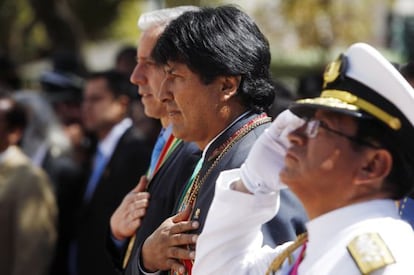Bolivia to present arguments in ocean outlet lawsuit against Chile
Morales tells incoming Chilean President Michelle Bachelet there is still time for dialogue

Bolivia on Sunday officially announced that it would next month present its historic and legal arguments as part of the international lawsuit it has filed against Chile over La Paz’s demand to regain access to the Pacific Ocean, an outlet it lost nearly 135 years ago.
During a ceremony held in La Paz, President Evo Morales called on Chile’s newly sworn-in leader, Michelle Bachelet, to initiate a dialogue that her predecessor refused to hold with Bolivia over the heated bilateral issue, which has frozen diplomatic relations for decades.
Bolivia lost 420 kilometers of Pacific and 120,000 square-kilometers of inland territory after Chilean forces invaded the region in the War of the Pacific, which took place between 1879 and 1883 after the government in Santiago declared war against Peru.
After many requests for talks and stonewalling by Chile, Morales said Bolivia would present the arguments with the International Court of Justice in The Hague on April 17. It is the first procedural step in the case, which was originally filed last year.
But he said there was still time for Bachelet’s Socialist administration to hold a dialogue with his government. “If a dictator like Augusto Pinochet proposed an outlet, we hope a Socialist government will make that petition come true,” Morales said, referring to talks held by the late Chilean strongman with Bolivia’s then-army dictator, Hugo Banzar, in 1975. The talks fell apart three years later.
Chilean authorities did not react immediately to Bolivia’s announcement.
We are a peaceful continent without wars or confrontations”
The Morales government declared March 23 Ocean Day to commemorate the death of national hero Eduardo Abaroa, who was killed on February 14, 1879 in Calama, the first Bolivarian town to resist Chilean forces after their invasion from the port of Antofagasta.
“Today, other winds are blowing in our America; we are a peaceful continent without wars or confrontations, and look for peaceful solutions to resolve the injustices of our history,” he said.
Chile is still reeling from an ICJ decision handed down in January in a decades-long maritime dispute that gave more territorial waters to Peru.
“Bolivia wants access to the ocean” before natural resources are depleted by transnational companies, Morales said. He also added that no country should prevent another from gaining access to the sea.
Bolivia has long believed that the economic damages are significant because Chile has benefited from the exploitation of guano, sulfur and saltpeter in the region – all then purchased by the British, which allegedly pushed for the invasion.
Chile and Bolivia broke diplomatic relations in 1962 when Bolivian officials accused the Chilean government of diverting the course of the Lauca river, which flows across their common board. Relations were reinstated briefly between Pinochet and Banzar in the late 1970s but again were suspended after bilateral talks broke down.
Currently, both countries hold only trade relations.
During Bachelet’s first term from 2006 to 2010, a 13-point discussion agenda was drafted but the talks never got off the ground after her successor, Sebastián Piñera, took office.
Tu suscripción se está usando en otro dispositivo
¿Quieres añadir otro usuario a tu suscripción?
Si continúas leyendo en este dispositivo, no se podrá leer en el otro.
FlechaTu suscripción se está usando en otro dispositivo y solo puedes acceder a EL PAÍS desde un dispositivo a la vez.
Si quieres compartir tu cuenta, cambia tu suscripción a la modalidad Premium, así podrás añadir otro usuario. Cada uno accederá con su propia cuenta de email, lo que os permitirá personalizar vuestra experiencia en EL PAÍS.
¿Tienes una suscripción de empresa? Accede aquí para contratar más cuentas.
En el caso de no saber quién está usando tu cuenta, te recomendamos cambiar tu contraseña aquí.
Si decides continuar compartiendo tu cuenta, este mensaje se mostrará en tu dispositivo y en el de la otra persona que está usando tu cuenta de forma indefinida, afectando a tu experiencia de lectura. Puedes consultar aquí los términos y condiciones de la suscripción digital.








































